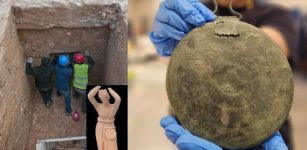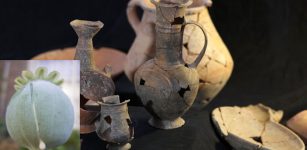Popular Tyrant Peisistratos Tricked The Athenians To Seize Power And People Loved Him
Ellen Lloyd - AncientPages.com - By modern definition, a tyrant is a cruel and oppressive ruler hated by most people.
Peisistratos was a tyrant, but this doesn’t mean he was a bad ruler and was certainly not despised by the people. On the contrary. He was immensely popular among poorer people because he did not hesitate to confront the aristocracy. He was a fair ruler who boosted the city’s economy and spread wealth equally among the Athenians.
Unlike many other rulers, Peisistratos did not seize power violently. Instead, he used a cunning and funny way to convince people he was their ideal ruler.
Born in 608 B.C. in Athens, Peisistratos was a one-time brother-in-law of Cleisthenes, an ancient Athenian lawgiver credited with reforming the constitution of ancient Athens and setting it on a democratic footing in 508 B.C. He was also related to the Athenian statesman, lawmaker, and poet Solon.
In 565 B.C. Peisistratos successfully managed to capture the port of Nisaea in nearby Megara. This victory made him famous, and he gained support from the Men of the Hill, the poorer and the majority of the population.
First Attempt To Trick The People Of Athens
Peisistratos way to power was not easy, and he encountered many obstacles. According to ancient Greek historian Herodotus, Peisistratos deliberately inflicted wounds on himself and his mules to demand from the Athenian people bodyguards for protection, which he received.
In The Histories, Herotodus writes: “…he inflicted wounds upon himself and upon his mules, and then drove his car into the market-place, as if he had just escaped from his opponents, who, as he alleged, had desired to kill him when he was driving into the country: and he asked the commons that he might obtain some protection from them, for before this he had gained reputation in his command against the Megarians, during which he took Nisaia and performed other signal service. And the commons of the Athenians being deceived gave him those 67 men chosen from the dwellers in the city who became not indeed the spear-men 68 of Peisistratos but his club-men; for they followed behind him bearing wooden clubs. And these made insurrection with Peisistratos and obtained possession of the Acropolis.
Then Peisistratos was ruler of the Athenians, not having disturbed the existing magistrates nor changed the ancient laws; but he administered the State under that constitution of things which was already established, ordering it fairly and well.
The Athenians celebrating the return of Peisistratos. Ellis, Edward Sylvester, 1840-1916; Horne, Charles F. (Charles Francis), 1870-1942 - The story of the greatest nations, from the dawn of history to the twentieth century (published in 1900). Credit: Public Domain
However, no long time after this the followers of Megacles and those of Lycurgos joined together and drove him forth. Thus Peisistratos had obtained possession of Athens for the first time, and thus he lost the power before he had it firmly rooted.
But those who had driven out Peisistratos became afterwards at feud with one another again. And Megacles, harassed by the party strife, 69 sent a message to Peisistratos asking whether he was willing to have his daughter to wife on condition of becoming despot.”
Second Attempt To Trick The Athenians Using Goddess Athena
Peisistratos did accept the arrangement, but he wanted people to see him as the best choice to be the ruler of Athens.
So, Peisistratos came up with an idea. One day, he rode into the city with a tall, young girl, claiming that she was goddess Athena, the patron goddess of Athens.
Amazed people watched as their magnificent goddess, dressed in full armor riding a golden chariot along the streets yelled to the onlookers: “"O Athenians, receive with favor Peisistratos, whom Athene herself, honoring him most of all men, brings back to her Acropolis."
As Herodotus explained: “So the heralds went about hither and thither saying this, and straightway there came to the demes in the country round a report that Athene was bringing Peisistratos back, while at the same time the men of the city, persuaded that the woman was the very goddess herself, were paying wor-ship to the human creature and receiving Peisistratos.”
Illustration from 1838 by M. A. Barth depicting the return of Peisistratos to Athens, accompanied by a woman dressed as Athena, as described by the Greek historian Herodotus. Credit: Public Domain
The young woman was, of course, not the goddess Athena. She was a girl raised in a nearby village, but people embraced Peisistratos as their new ruler. Whether the Athenians knew this woman was not the goddess Athena is unknown. Some people may have suspected this was a clever political maneuver to gain power, and his efforts paid off.
One can say his means were dishonest, but his leadership was better than most in those before the birth of true democracy. He used his power in a favorable way with the aim of turning his people into his allies, especially the working class.
In Athens, Peisistratos' public building projects provided jobs to needy people while simultaneously making the city a cultural center. Peisistratos ignored the ruling aristocracy. Instead, he focused his attention on helping poorer people by reducing their taxes and giving them free loans to help them build up their farms. He improved not only the city's economy but also Athens's infrastructure.
With its water supply and situation, Athens was greatly improved during the rule of Peisistratos through the construction of an aqueduct. The tyrant knew that access to water was a basic human need, and people were delighted they could have water to drink, cook, and clean.
There is no doubt Peisistratos did much to help Athens prosper, and he was a man loved by the common people. When he died sometime around 527 – 528 B.C., he was succeeded by his eldest son, Hippias, who was also a tyrant. However, Hippias was a paranoid and oppressive ruler, and he never gained the same popularity as his father once had.
Updated on December 23, 2022
Written by Ellen Lloyd – AncientPages.com
Copyright © AncientPages.com All rights reserved. This material may not be published, broadcast, rewritten or redistributed in whole or part without the express written permission of AncientPages.com
More From Ancient Pages
-
 Ancient Riddle Solved – Why Was Roman Concrete So Durable?
Archaeology | Jan 7, 2023
Ancient Riddle Solved – Why Was Roman Concrete So Durable?
Archaeology | Jan 7, 2023 -
 Napta Playa – Egypt’s Stonehenge And Its Ancient Astronomical Alignments
Featured Stories | Feb 18, 2018
Napta Playa – Egypt’s Stonehenge And Its Ancient Astronomical Alignments
Featured Stories | Feb 18, 2018 -
 Secrets Of The Uruk Prophecy Found In The Ancient Library Of A Magician With Divine Powers
Featured Stories | Mar 18, 2025
Secrets Of The Uruk Prophecy Found In The Ancient Library Of A Magician With Divine Powers
Featured Stories | Mar 18, 2025 -
 Mysterious City Lost In The Sands And Its Hidden Treasures
Ancient Mysteries | May 21, 2018
Mysterious City Lost In The Sands And Its Hidden Treasures
Ancient Mysteries | May 21, 2018 -
 3,800-Year-Old Cuneiform Clay Tablet With Agreement To Purchase A City Discovered In An Ancient Tumulus In Turkey
Archaeology | Aug 11, 2023
3,800-Year-Old Cuneiform Clay Tablet With Agreement To Purchase A City Discovered In An Ancient Tumulus In Turkey
Archaeology | Aug 11, 2023 -
 How Emma Of Normandy Risked Her Life To Save England
Featured Stories | Mar 20, 2021
How Emma Of Normandy Risked Her Life To Save England
Featured Stories | Mar 20, 2021 -
 Meet The First Neanderthal Family And Community
Archaeology | Oct 19, 2022
Meet The First Neanderthal Family And Community
Archaeology | Oct 19, 2022 -
 95% Of All Modern Europeans Descended From The Seven Daughters Of Eve
Civilizations | Dec 12, 2019
95% Of All Modern Europeans Descended From The Seven Daughters Of Eve
Civilizations | Dec 12, 2019 -
 Rare 2,300-Year-Old Tomb Of Greek Courtesan Found In Jerusalem Burial Cave
Archaeology | Sep 28, 2023
Rare 2,300-Year-Old Tomb Of Greek Courtesan Found In Jerusalem Burial Cave
Archaeology | Sep 28, 2023 -
 Interaction Between Homo Sapiens And Neanderthals Studied Using New Radiocarbon 3.0 Method
Archaeology | Feb 15, 2023
Interaction Between Homo Sapiens And Neanderthals Studied Using New Radiocarbon 3.0 Method
Archaeology | Feb 15, 2023 -
 Opium Residue Discovered In 3,500-Year-Old Pottery Offers Evidence The Drug Was Used In Ancient Burial Rituals
Archaeology | Sep 20, 2022
Opium Residue Discovered In 3,500-Year-Old Pottery Offers Evidence The Drug Was Used In Ancient Burial Rituals
Archaeology | Sep 20, 2022 -
 Unique Ancient Roman Boxing Gloves Discovered Near Hadrian’s Wall – The Only Surviving Example From 120 A.D.
Archaeology | Feb 20, 2018
Unique Ancient Roman Boxing Gloves Discovered Near Hadrian’s Wall – The Only Surviving Example From 120 A.D.
Archaeology | Feb 20, 2018 -
 The Brujo De Chiloé – The Wild Warlocks Of The Chiloé Archipelago
Featured Stories | May 4, 2022
The Brujo De Chiloé – The Wild Warlocks Of The Chiloé Archipelago
Featured Stories | May 4, 2022 -
 Ancient Board Game Mancala Can Unlock Cutting-Edge Physics Discoveries
Artifacts | Sep 30, 2023
Ancient Board Game Mancala Can Unlock Cutting-Edge Physics Discoveries
Artifacts | Sep 30, 2023 -
 4,000-Year-Old Babylonian Tablets Finally Deciphered, Revealing Dangerous Future Predictions
Archaeology | Aug 14, 2024
4,000-Year-Old Babylonian Tablets Finally Deciphered, Revealing Dangerous Future Predictions
Archaeology | Aug 14, 2024 -
 Teeth Pendants And Prominent Status Of Elks In Stone Age – New Study
Artifacts | Jan 15, 2021
Teeth Pendants And Prominent Status Of Elks In Stone Age – New Study
Artifacts | Jan 15, 2021 -
 Impact Of European Contact With Pacific Islands Was Devastating – New Study Reveals
Archaeology | Sep 30, 2022
Impact Of European Contact With Pacific Islands Was Devastating – New Study Reveals
Archaeology | Sep 30, 2022 -
 Mysterious And Unexplained Encounter With Unusual Tiny Beings In Italy – The Thing – Part 1
Featured Stories | Jan 15, 2022
Mysterious And Unexplained Encounter With Unusual Tiny Beings In Italy – The Thing – Part 1
Featured Stories | Jan 15, 2022 -
 Rare Gilded Mask Discovered On Mummy Of Ancient Egyptian Priest Serving Sky Goddess Mut
Archaeology | Jul 17, 2018
Rare Gilded Mask Discovered On Mummy Of Ancient Egyptian Priest Serving Sky Goddess Mut
Archaeology | Jul 17, 2018 -
 Strange Case Of The ‘Impossible’ Glove Remains Unexplained – The Discovery – Part 1
Featured Stories | May 24, 2019
Strange Case Of The ‘Impossible’ Glove Remains Unexplained – The Discovery – Part 1
Featured Stories | May 24, 2019



